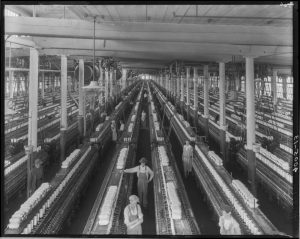Between 1974 and 1978, the Chapel Hill Historical Society conducted interviews with men and women who had lived and worked in and around Chapel Hill and Carrboro during the early twentieth century. One of their first projects, “Generations of Carrboro Mill Families” consisted of 117 interviews with Carrboro residents and textile mill workers. The interviews were in response to the Carrboro Board of Alderman’s decision to tear down the original Carr Mill building. For a rather complicated, and long-winded reason, the Southern Historical Collection holds 40 of the 117 interviews conducted, both the audio cassette tapes and their 30-50 page typed transcripts. Question topics run the gamut, and there was a clear effort on the part of the Chapel Hill Historical Society interviewers to gather information about “everyday life.”

This image of a textile mill in Greensboro, NC shows a carding room ca. 1904-1954, probably similar to the one the interviewees describe from the mills in Carrboro.
Some of this work is captured in Valerie Quinney’s article, “Mill Village Memories” published in Southern Exposure in Fall 1980. Quinney was one of the interviewers from the Chapel Hill Historical Society in the 1970s. She offers a meaningful overview of the oral history collection and provides supportive context. Although she includes direct quotes, there’s value in the raw format of the interview collection that is worth pursuing.
Continue reading “A Rare Gateway to an Untouchable Past: Oral Histories of Carrboro Mill Families”


![(detail) William Bagley to Mose G. Pierce, from William Bagley Letter Books, SHC #863-z. [detail] William Bagley to Mose G. Pierce (from William Bagley Letter Books, SHC #863-z)](https://blogs.lib.unc.edu/shc/wp-content/uploads/sites/10/2009/08/images-012-300x206.jpg)

